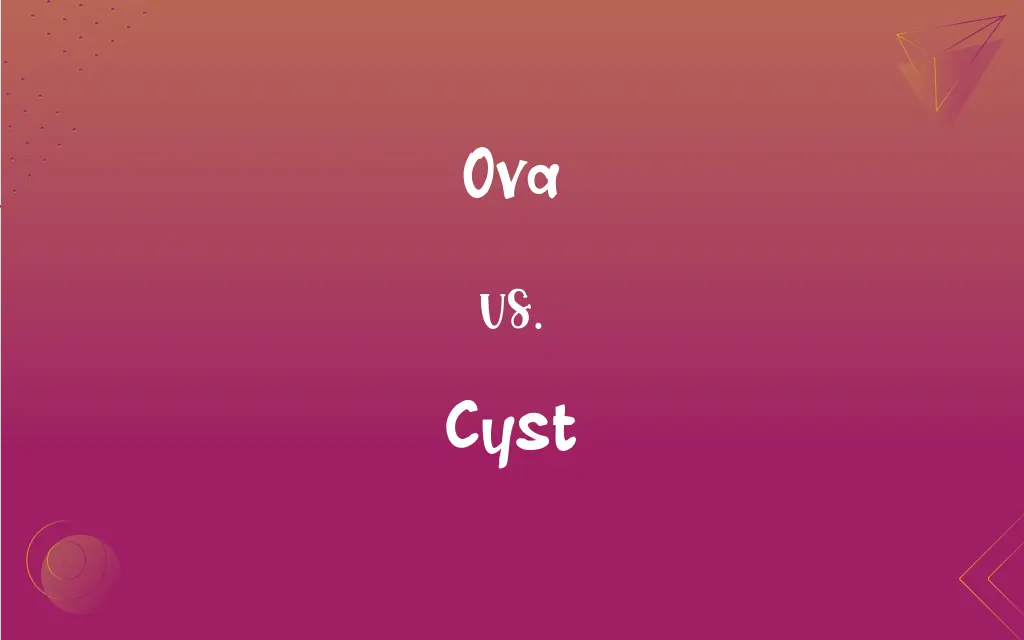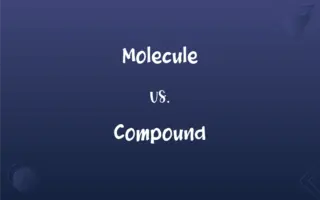Ova vs. Cyst: What's the Difference?
Edited by Janet White || By Harlon Moss || Updated on October 28, 2023
Ova are female reproductive cells, while cysts are sac-like structures that can form in various parts of the body.

Key Differences
Ova and cyst are both terms used in biology and medicine, yet they represent vastly different concepts. Ova refer to the female gametes, or reproductive cells, in animals. These cells, once fertilized by male gametes (sperm), can develop into embryos. On the other hand, cysts are closed sac-like structures that can contain air, fluid, or semi-solid material. They can form anywhere in the body and are not necessarily related to reproduction.
In the context of human reproduction, ova, or eggs, are produced in the ovaries and play a pivotal role in the process of fertilization and subsequent development into an embryo. Cysts, especially when discussed in relation to the ovaries, might refer to fluid-filled sacs that can develop on the ovaries, known as ovarian cysts. However, it's crucial to note that not all cysts are ovarian cysts.
The presence of ova is a natural and essential aspect of female biology, ensuring the continuation of species. Every female is born with a fixed number of ova, which decrease in number and quality as she ages. Cysts, while they can be a natural occurrence, such as follicular cysts that form during the menstrual cycle, can sometimes indicate underlying health issues. Some cysts might be benign, while others could be malignant.
It's crucial to differentiate between the two terms, especially in clinical settings. While ova are integral to the reproductive process, cysts, depending on their type and location, may require medical attention. Both terms, though different in meaning, are essential in understanding female reproductive health and overall human biology.
Comparison Chart
Definition
Female reproductive cells
Sac-like structures containing air, fluid, or semi-solid material.
ADVERTISEMENT
Location
Ovaries in females
Anywhere in the body
Function
Fertilization & reproduction
May have no specific function or could indicate an underlying condition.
Nature
Natural and essential
Can be benign, malignant, or natural
Relation
Reproductive system
Varies depending on type and location
Ova and Cyst Definitions
Ova
The mature eggs produced by the ovaries.
Women are born with a fixed number of ova.
ADVERTISEMENT
Cyst
A protective capsule formed by certain organisms, especially in unfavorable conditions.
Some parasites form a cyst to survive harsh environmental conditions.
Ova
The female reproductive cells in animals.
The ova are fertilized by sperm to form embryos.
Cyst
A sac that can be benign or malignant, often requiring medical evaluation.
She went for regular check-ups to monitor the cyst on her ovary.
Ova
The cellular units of heredity in females.
The ova carry half the genetic information required for the offspring.
Cyst
A closed sac-like structure that can contain air, fluid, or semi-solid material.
The doctor found a cyst on her kidney during the ultrasound.
Ova
The counterpart to male gametes in sexual reproduction.
Ova require fertilization by sperm to produce a zygote.
Cyst
An abnormal growth that can form in various parts of the body.
The cyst on his wrist was benign and didn't require surgery.
Ova
The plural form of ovum, referring to multiple eggs.
The human ovaries release ova during the menstrual cycle.
Cyst
A structure that might indicate underlying health issues depending on its type.
It's important to get a cyst checked to ensure it's not cancerous.
Ova
Plural of ovum.
Cyst
An abnormal membranous sac in the body containing a gaseous, liquid, or semisolid substance.
Ova
Qualifier|scientific term}} {{plural of ovum
Ova
See Ovum.
FAQs
Is there a connection between ova and ovarian cysts?
While ova are naturally produced eggs, ovarian cysts are sac-like growths on the ovaries.
What is a cyst?
A cyst is a closed sac-like structure that can contain air, fluid, or semi-solid material.
Can cysts be harmful?
Some cysts are benign, but others can be malignant and require medical attention.
Are cysts contagious?
No, cysts are not contagious.
Do ova age over time?
Yes, the number and quality of ova decrease as a woman ages.
Is the term "ovum" related to ova?
Yes, "ovum" is the singular form, and "ova" is the plural.
Are all cysts related to the reproductive system?
No, cysts can form anywhere in the body.
How many ova does a female typically have?
Females are born with a set number, which decreases over time.
Can you feel a cyst?
Some cysts, depending on their location, can be felt, while others cannot.
Can a cyst affect fertility?
Certain types of cysts, like some ovarian cysts, might impact fertility.
Are ova and eggs the same?
Yes, in the context of reproduction, ova are often referred to as eggs.
How do ova carry genetic information?
Ova carry half the genetic material needed for an offspring.
Are all cysts detected through physical exams?
No, some cysts may require imaging studies like ultrasounds for detection.
What are ova?
Ova are the female reproductive cells or eggs in animals.
Where are ova produced?
Ova are produced in the ovaries of females.
Are cysts always visible?
No, some cysts are microscopic, while others are more prominent.
Do all cysts require surgery?
Not all cysts require surgery; it depends on their nature and location.
Can cysts reappear after removal?
Yes, there's a possibility of cysts reoccurring after removal.
What role do ova play in in-vitro fertilization (IVF)?
In IVF, ova are extracted, fertilized outside the body, and then implanted.
How are ova involved in reproduction?
Ova are fertilized by sperm, leading to embryo formation.
About Author
Written by
Harlon MossHarlon is a seasoned quality moderator and accomplished content writer for Difference Wiki. An alumnus of the prestigious University of California, he earned his degree in Computer Science. Leveraging his academic background, Harlon brings a meticulous and informed perspective to his work, ensuring content accuracy and excellence.
Edited by
Janet WhiteJanet White has been an esteemed writer and blogger for Difference Wiki. Holding a Master's degree in Science and Medical Journalism from the prestigious Boston University, she has consistently demonstrated her expertise and passion for her field. When she's not immersed in her work, Janet relishes her time exercising, delving into a good book, and cherishing moments with friends and family.































































